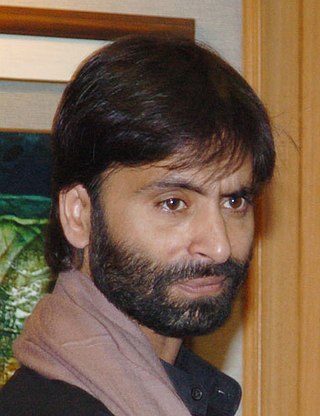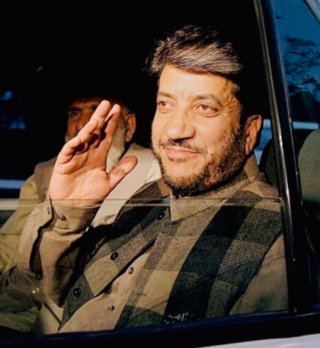Related Research Articles

Jammu and Kashmir was a region formerly administered by India as a state from 1952 to 2019, constituting the southern and southeastern portion of the larger Kashmir region, which has been the subject of a dispute between India, Pakistan and China since the mid-20th century. The underlying region of this state were parts of the former princely state of Jammu and Kashmir, whose western districts, now known as Azad Kashmir, and northern territories, now known as Gilgit-Baltistan, are administered by Pakistan. The Aksai Chin region in the east, bordering Tibet, has been under Chinese control since 1962.

The insurgency in Jammu and Kashmir, also known as the Kashmir insurgency, is an ongoing separatist militant insurgency against the Indian administration in Jammu and Kashmir, a territory constituting the southwestern portion of the larger geographical region of Kashmir, which has been the subject of a territorial dispute between India and Pakistan since 1947.

Doda district is an administrative district of the Jammu division of Indian-administered Jammu and Kashmir in the disputed Kashmir region. Doda covers 2,625 square kilometers.

The Kashmir conflict is a territorial conflict over the Kashmir region, primarily between India and Pakistan, and also between China and India in the northeastern portion of the region. The conflict started after the partition of India in 1947 as both India and Pakistan claimed the entirety of the former princely state of Jammu and Kashmir. It is a dispute over the region that escalated into three wars between India and Pakistan and several other armed skirmishes. India controls approximately 55% of the land area of the region that includes Jammu, the Kashmir Valley, most of Ladakh, the Siachen Glacier, and 70% of its population; Pakistan controls approximately 30% of the land area that includes Azad Kashmir and Gilgit-Baltistan; and China controls the remaining 15% of the land area that includes the Aksai Chin region, the mostly uninhabited Trans-Karakoram Tract, and part of the Demchok sector.

Yasin Malik is a Kashmiri separatist leader and former militant who advocates the separation of Kashmir from both India and Pakistan. He is the chairman of the Jammu Kashmir Liberation Front, which originally spearheaded armed militancy in the Kashmir Valley. Malik renounced violence in 1994 and adopted peaceful methods to come to a settlement of the Kashmir conflict. In May 2022, Malik pleaded guilty to charges of criminal conspiracy and waging war against the state, and was sentenced to life imprisonment.
Mohammad Yusuf Shah, commonly known as Syed Salahuddin, is the head of Hizbul Mujahideen, a terrorist organization operating in Kashmir. He also heads the United Jihad Council, a Pakistan-based conglomeration of jihadist militant groups sponsored by the ISI, with the goal of merging Jammu and Kashmir with Pakistan.
The Indira–Sheikh Accord, also known as the Indira–Abdullah Accord, was an accord between Indira Gandhi, the then prime minister of India, and Sheikh Abdullah, leader of the Plebiscite Front. The accord decided the terms under which Abdullah would reenter the politics of Kashmir. It allowed Abdullah to become the chief minister of Jammu and Kashmir again after 22 years and enabled competitive politics in the State.
The Kunan Poshspora incident was a mass rape that occurred on 23 February 1991 when a unit of the Indian security forces, after being fired upon by militants, launched a search operation in the twin villages of Kunan and Poshpora, located in Kashmir's remote Kupwara district. While the first information report filed in the local police station after a visit by the local magistrate reported the number of women who reported rape as 23, the Human Rights Watch assessed the number of survivors to be up to 100.

Justice Bilal Nazki is an Indian jurist. He is a former Chief Justice of Orissa High Court and has served as High Court Judge in the High Courts of Jammu & Kashmir, Andhra Pradesh and Bombay. He has also served as the Chairman of the Jammu & Kashmir State Human Rights Commission and the Human Rights Commission of Bihar. He also headed the committee set up by the Government of India to review the functioning of the Haj Committee of India and its state units.

Shabir Ahmad Shah popularly known as Shabir Shah, in Kadipora, Anantnag, Kashmir is the founder and president of the Jammu and Kashmir Democratic Freedom Party (JKDFP), one of the main separatist political organizations seeking "right of self-determination" to Jammu and Kashmir.
Human rights abuses in Jammu and Kashmir range from mass killings, enforced disappearances, torture, rape and sexual abuse to political repression and suppression of freedom of speech. The Indian Army, Central Reserve Police Force (CRPF), and Border Security Personnel (BSF) have been accused of committing severe human rights abuses against Kashmiri civilians. According to Seema Kazi, militant groups have also been held responsible for similar crimes, but the vast majority of abuses have been perpetrated by the armed forces of the Indian government.
Election for the Indian state of Jammu and Kashmir were held on 23 March 1987. Farooq Abdullah was reappointed as the Chief Minister.

The Exodus of Kashmiri Hindus, or Pandits, is their early-1990 migration, or flight, from the Muslim-majority Kashmir valley in Indian-administered Kashmir following rising violence in an insurgency. Of a total Pandit population of 120,000–140,000 some 90,000–100,000 left the valley or felt compelled to leave by the middle of 1990, by which time about 30–80 of them are said to have been killed by militants.
Qasim Faktoo is a Kashmiri separatist and militant, serving life imprisonment for the murder of Hriday Nath Wanchoo. He had been among the earliest members of Hizbul Mujahideen.
Farooq Ahmed Dar known by his nom de guerre Bitta Karate, is a Kashmiri Terrorist, who currently serves as the chairman of the Jammu Kashmir Liberation Front (R) in the Kashmir Valley of Jammu and Kashmir, India.
Elections for the Indian state of Jammu and Kashmir were held in February 1967. Ghulam Mohammed Sadiq was appointed Chief Minister of Jammu and Kashmir.
Mirwaiz Muhammad Yusuf Shah was a religious leader and politician in the princely state of Jammu and Kashmir during the British Raj. He served as the Imam of the Jama Masjid in Srinagar, a position that is also known as the "Mirwaiz of Kashmir". He relegated the majority of his political career to opposing the Jammu & Kashmir National Conference of Sheikh Abdullah, including siding with Pakistan during the First Kashmir War. He moved to Azad Kashmir and eventually served as the president of Azad Kashmir.
The 2020 Amshipora murders, or the Amshipora fake encounter, or the Shopian fake encounter, refers to the killing of three Kashmiri laborers, one of whom was a minor, by Indian military personnel of the Rashtriya Rifles in the village of Amshipora, in the district of Shopian, in Jammu and Kashmir, on 18 July 2020. The Indian Army initially claimed that the three victims were foreign terrorists who had been killed in an encounter with security forces after they opened fire on a security team. Preliminary investigations by the Indian Army in a Court of Inquiry, as well as by the Jammu and Kashmir Police, alleged that Army personnel, aided by civilian informants, had staged the encounter and killed three labourers who were working for daily wages in local orchards, allegedly to claim a cash bounty of ₹20 lakh, which is granted by the Indian Army as a reward for killing militants. The Indian Army is currently conducting a court-martial proceeding against Army Captain Bhoopendra Singh of the Rashtriya Rifles, as well as an unnamed non-commissioned officer, while proceedings are ongoing against two civilian informants in local courts in Kashmir.
Roshni Act controversy, also referred to as Roshni Act scam or Roshni land scam, is an alleged scam in the Indian union territory of Jammu and Kashmir, involving the illegal transfer of 20,46,436 kanals of state land, valued at approximately ₹25,000 crore to 400 beneficiaries, whose legal status or claims remain contested, under the now-repealed Roshni Act. The scam includes allegations of political corruption, favoritism, and illegal land transfers made under the Act.
References
- ↑ "Opinion | In India, Misery and Corruption Fuel Violence; Kashmiri Activist Dead". The New York Times. 31 December 1992. ISSN 0362-4331 . Retrieved 23 March 2022.
- 1 2 WANCHOO, DR AMIT (23 May 2020). "Hridai: A heart that understood human suffering". Greater Kashmir. Retrieved 23 March 2022.
- ↑ Prakash, Ved (2008). "Terrorist Outfits in Jammu and Kashmir". Terrorism in Northern India: Jammu and Kashmir and the Punjab. Vol. 1. Delhi: Kalpaz Publications. pp. 91–92. ISBN 9788178357348.
- 1 2 "Behind the Kashmir Conflict - Threats against Human Rights Defenders (Human Rights Watch Report, July 1999)". www.hrw.org. Retrieved 23 March 2022.
- ↑ Varadarajan, Patanjali M. A Report on Torture, Extra-judicial Executions, Rape, Arbitrary Arrests, Disappearances and other Violations of Basic Human Rights by the Indian Security Forces in Indian-administered Kashmir. (Undertaken in co-operation with Federation Internationale des Droits de L'Homme)
- ↑ 2003 (2) JKJ 774: Ashiq Hussain Faktoo vs Union Of India (Uoi) And Ors. Jammu & Kashmir High Court. 20 February 2001
- 1 2 3 Central Bureau Of Investigation v. Ashiq Hussain Faktoo & Ors(Supreme Court of India30 January 2003), Text .
- ↑ "Arrested Valley hardliner hid at homes of Cong, PDP leaders". Indian Express. Archived from the original on 25 February 2020. Retrieved 11 July 2023.
- ↑ "3 JuM militants get lifer in Wanchoo case". The Times of India. 2 February 2003. Retrieved 1 December 2022.
- 1 2 "3 JuM militants get lifer in Wanchoo case". The Times of India. 2 February 2003. Retrieved 1 December 2022.
- 1 2 Central Bureau Of Investigation v. Ashiq Hussain Faktoo & Ors(Supreme Court of India30 January 2003), Text .
- ↑ Ashiq Hussain Faktoo vs Union Of India & Ors(Supreme Court of India30 August 2016), Text .
- ↑ Bose, Sumantra (1 July 2009). Kashmir: Roots of Conflict, Paths to Peace. Harvard University Press. p. 132. ISBN 978-0-674-02855-5.
- ↑ "Kashmir, Gender and Militarization in - Oxford Islamic Studies Online". www.oxfordislamicstudies.com. Retrieved 23 March 2022.[ dead link ]